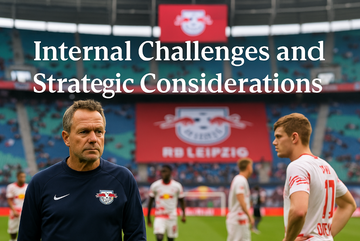When Success Isn’t Enough: Leadership, Silos, and the Limits of Legacy at RB Leipzig
by Uwe Seebacher on Mar 31, 2025

What Marco Rose’s Exit and Jürgen Klopp’s Rise Reveal About Silos, the Peter Principle, and Strategic Misalignment in Red Bull’s Football Ecosystem
The recent dismissal of head coach Marco Rose by RB Leipzig has sparked significant discussion within the football community. This decision, influenced by Jürgen Klopp in his capacity as Red Bull's Global Head of Soccer, highlights the intricate dynamics of leadership transitions within football clubs. This article examines the internal developments leading to Rose's departure, the challenges faced by RB Leipzig, and the implications of Klopp's involvement.
Contextualizing Marco Rose's Tenure and Dismissal
Marco Rose assumed the role of RB Leipzig's head coach in September 2022, bringing with him a commendable track record from his previous engagements with Borussia Mönchengladbach and Borussia Dortmund. Under his guidance, Leipzig secured the DFB-Pokal and achieved two UEFA Champions League qualifications. However, the 2024–25 season presented formidable challenges, with the team securing only two victories in their last eleven Bundesliga matches, culminating in a 1-0 defeat to Borussia Mönchengladbach. This sequence of results precipitated Leipzig's descent to sixth place in the Bundesliga standings, jeopardizing their prospects for Champions League qualification.
The club's managing director for sport, Marcel Schäfer, articulated the necessity for a "new impulse" to reverse the team's trajectory, emphasizing the imperative to realign with the club's strategic objectives.
Jürgen Klopp's Strategic Influence
Jürgen Klopp's appointment as Red Bull's Global Head of Soccer in January 2025 introduced a new dimension to the organization's football operations. Entrusted with overseeing the coaching, development, and transfer strategies across Red Bull's football portfolio, including RB Leipzig, Klopp's role is pivotal in shaping the clubs' strategic direction. Despite his prior professional association with Marco Rose during their tenure at Mainz 05, Klopp endorsed the decision to terminate Rose's contract, underscoring a commitment to the club's long-term performance objectives over personal affiliations.
Appointment of Zsolt Löw as Interim Head Coach
In the aftermath of Rose's departure, RB Leipzig appointed Zsolt Löw as interim head coach until the conclusion of the 2024–25 season. Löw's extensive coaching background encompasses assistant roles at prominent clubs such as Paris Saint-Germain, Chelsea, and Bayern Munich, where he collaborated with Thomas Tuchel. His familiarity with RB Leipzig's operational ethos, stemming from his previous tenure as assistant coach under Ralph Hasenhüttl, positions him as a strategic choice to navigate the team through this transitional phase.
Internal Challenges and Strategic Considerations
RB Leipzig’s current crisis cannot be fully understood through the lens of short-term results alone. Rather, it reveals deeper structural and strategic tensions within the club’s operations—tensions that have been exacerbated by leadership volatility and shifting organizational priorities in the wake of Dietrich Mateschitz’s passing.
One key area of concern lies in player development and utilization. Leipzig, like other Red Bull clubs, has long prided itself on its commitment to cultivating young talent. However, this developmental model is increasingly challenged by the need to simultaneously remain competitive at the highest level. Players are often sent out on loan to gain experience, yet the club appears to lack a robust reintegration framework. As a result, promising talent is frequently returned to a system that lacks both continuity and strategic clarity, leading to underutilization or poor fit within the current tactical set-up.
This misalignment between talent management and first-team needs is symptomatic of a broader issue: the absence of a coherent, long-term squad philosophy that transcends individual managerial appointments.
This leads to a second challenge—tactical consistency. Under Marco Rose, the team experienced moments of brilliance, but also suffered from oscillating identity and form. With his dismissal and the interim appointment of Zsolt Löw, the club enters yet another phase of transition. Each managerial shift brings new training methods, strategic preferences, and hierarchical dynamics, which inevitably disrupt established routines. The result is a lack of cohesion and predictability—both essential ingredients for high-performance teams. In this regard, RB Leipzig mirrors many modern organizations that fail to invest in institutional memory, relying instead on the short-lived vision of individual leaders.
Perhaps most critically, the club is grappling with issues of psychological resilience. While the physical capabilities of the squad are unquestioned, recent performances suggest a mental fragility that may stem from inconsistent leadership, unclear roles, and wavering trust in the broader strategic direction of the club. Research in organizational behavior, including Amy Edmondson’s work on psychological safety, emphasizes that in environments marked by uncertainty, even highly skilled individuals can experience disengagement or performance decline. For players, the persistent uncertainty about leadership, coupled with shifting expectations, has likely undermined their collective sense of control and confidence.
These internal challenges are not isolated—they are interlinked. The failure to harmonize player development with tactical continuity weakens team identity.
The absence of psychological resilience, in turn, is exacerbated by these inconsistencies. All are amplified by a broader lack of direction stemming from the evolving leadership structure within Red Bull’s sports ecosystem. The pressing question is whether the current system—with its emphasis on modular autonomy and rotating leadership—can produce the kind of integrated, resilient organization that modern elite football demands. Or whether the Red Bull model, once heralded as a disruptive force in football, is now revealing its structural limitations in the absence of a unifying leadership philosophy.
Exploring Underlying Causes of Performance Decline
Beyond the immediate performance metrics, several systemic factors may have contributed to RB Leipzig's challenges:
-
Organizational Silos and Communication Barriers: The integration of RB Leipzig within Red Bull's global football portfolio necessitates seamless communication and strategic alignment across various entities. The presence of organizational silos can impede information flow, leading to misaligned objectives and strategies that adversely affect on-field performance.
-
Application of the Peter Principle: This principle suggests that individuals within a hierarchical organization tend to rise to their "level of incompetence." Rose's previous successes facilitated his ascension to RB Leipzig; however, the competencies that yielded success in one context may not directly translate to another, indicating that his appointment may have inadvertently exemplified this principle.
-
Post-Growth Organizational Challenges: As organizations mature, they often encounter challenges associated with sustaining growth and innovation. RB Leipzig's rapid ascent in European football may have led to a plateau, where previous strategies became less effective, necessitating a reevaluation of approaches to maintain competitive advantage.
Lessons Learned and Strategic Reflections
The confluence of these factors underscores several critical insights:
-
Holistic Evaluation of Leadership Candidates: The selection of individuals for leadership roles should extend beyond past achievements, incorporating assessments of adaptability, contextual intelligence, and alignment with organizational culture.
-
Addressing Structural Impediments: Proactive measures to dismantle silos and foster cross-functional collaboration can enhance organizational agility and coherence.
-
Embracing Continuous Evolution: Recognizing and addressing the inevitability of post-growth challenges can facilitate the development of innovative strategies to sustain performance and relevance.
Reassessing Leadership Appointments: The Case of Jürgen Klopp
The appointment of Jürgen Klopp as Red Bull's Global Head of Soccer raises pertinent questions about the competencies required for such a role. Klopp's distinguished coaching career is characterized by passionate and immersive leadership, yielding significant success at clubs like Liverpool. However, the transition to a global strategic role demands proficiencies in organizational management, cross-cultural communication, and long-term strategic planning. While Klopp's deep understanding of the game and charismatic leadership are invaluable, it is imperative to consider whether alternative candidates with specialized expertise in these domains might better fulfill the requirements of such a position.
Conclusion
The situation at RB Leipzig serves as a poignant reminder of the complexities involved in leadership transitions within dynamic and multifaceted organizations. It underscores the necessity for a nuanced approach to leadership selection and development, balancing technical expertise with strategic acumen and contextual adaptability. As Red Bull continues to refine its global football strategy, these insights may prove instrumental in informing future leadership appointments and organizational practices.
Source:
https://www.flashscore.com/news/soccer-bundesliga-rb-leipzig-part-ways-with-coach-rose-low-named-as-interim-replacement/YTAWmkQ7/
https://tribuna.com/en/news/liverpoolfc-2024-10-17-jurgen-klopps-first-actions-at-red-bull-outline-his-new-role-after-leaving-liverpool/
https://www.bavarianfootballworks.com/2025/3/30/24397107/bundesliga-watch-rb-leipzig-sacks-marco-rose-bayern-munich-bundesligahttps://www.theguardian.com/football/2025/mar/30/rb-leipzig-sack-manager-marco-rose-bundesliga
https://talksport.com/football/3065810/marco-rose-sacked-rb-leipzig-jurgen-klopp-bundesliga/
https://www.bild.de/sport/fussball/rb-leipzig-zsolt-loew-soll-fuer-gefeuerten-rose-als-trainer-uebernehmen-67e92b34032de159434f4207
https://pt.wikipedia.org/wiki/J%C3%BCrgen_Klopp
This article was developed with support of artificial and predictive intelligence.





